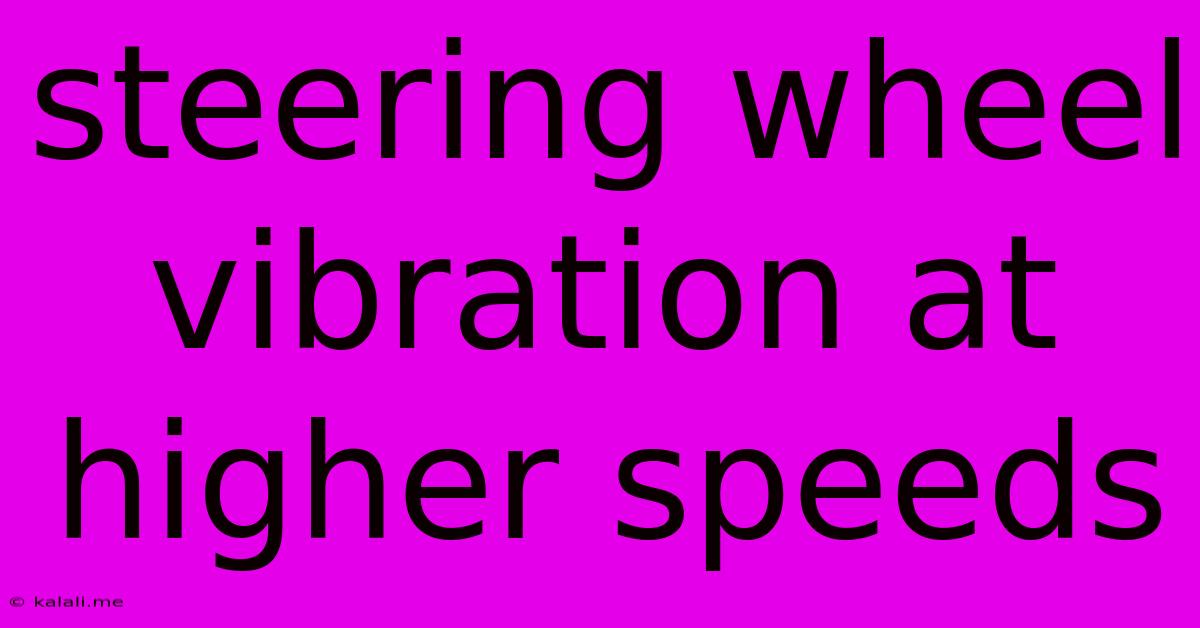Steering Wheel Vibration At Higher Speeds
Kalali
May 19, 2025 · 3 min read

Table of Contents
Steering Wheel Vibration at Higher Speeds: Causes and Solutions
Steering wheel vibration at higher speeds is a common problem that can significantly impact your driving experience and safety. This annoying shudder can range from a mild tremor to a violent shake, making it difficult to maintain control of your vehicle. Understanding the underlying causes is the first step towards resolving this issue. This article will explore the common culprits behind this problem and suggest potential solutions.
Why is my steering wheel vibrating at high speeds? This is often caused by issues related to your tires, wheels, suspension, or even your steering system. Let's dive deeper into the specific causes.
Tire-Related Issues: The Most Common Culprits
-
Tire Balance: This is the most frequent cause of steering wheel vibration. An imbalance means the weight distribution within the tire isn't uniform, causing it to wobble at higher speeds. This imbalance translates directly to the steering wheel. Regular tire rotations and professional balancing are crucial for preventative maintenance.
-
Tire Wear: Uneven tire wear, such as cupping or feathering, can also lead to vibrations. This indicates potential alignment problems or issues with your suspension. Inspect your tires regularly for wear patterns. If you notice uneven wear, it's time for a professional inspection.
-
Tire Damage: Hidden damage like a belt separation, internal punctures, or impact damage can create imbalances and vibrations. These are harder to detect visually and often require a professional tire inspection. Check your tires for cuts, bulges, or any other signs of damage.
Wheel-Related Problems
-
Bent or Damaged Wheels: A bent or damaged wheel, often caused by hitting a pothole or curb, will cause vibrations. This is particularly noticeable at higher speeds. Inspect your wheels carefully for any bends or cracks.
-
Wheel Hub Assembly: Problems with the wheel hub, the central component that connects the wheel to the vehicle, can also lead to vibrations. This may include worn bearings or a damaged assembly. A damaged wheel hub assembly can manifest as a vibration that increases with speed.
Suspension and Steering System Issues
-
Suspension Components: Worn ball joints, tie rod ends, or other suspension components can create looseness in the steering system, resulting in vibrations, especially at higher speeds. Regular suspension checks are essential for safety and to prevent premature wear.
-
Steering Rack and Pinion: Damage or wear to the steering rack and pinion can also contribute to vibrations. This is usually accompanied by other steering issues, like play or noise.
-
Driveshaft Issues: In some cases, problems with the driveshaft, particularly if it's worn or unbalanced, can transmit vibrations to the steering wheel, especially at higher speeds. This is less common than the tire and wheel issues but should be investigated if other possibilities have been ruled out.
Diagnosing the Problem
Pinpointing the exact cause often requires a professional inspection. A qualified mechanic can use specialized equipment to identify the source of the vibration. They will likely conduct a thorough inspection of your tires, wheels, suspension, and steering system. They might perform a wheel balance, alignment check, or more extensive diagnostic tests, depending on their findings.
Preventing Steering Wheel Vibration
Regular maintenance is key to preventing steering wheel vibration. This includes:
- Regular tire rotations and balancing: Aim for every 5,000-7,000 miles or as recommended by your vehicle's manufacturer.
- Regular tire pressure checks: Maintaining the correct tire pressure is crucial for optimal tire life and performance.
- Regular suspension checks: Have your suspension components inspected during routine maintenance visits.
- Careful driving habits: Avoid hitting potholes and curbs, which can damage your wheels and suspension.
Steering wheel vibration at higher speeds is a serious issue that shouldn't be ignored. Addressing the problem promptly can prevent further damage to your vehicle and ensure your safety on the road. Remember, professional diagnosis and repair are often necessary to resolve the underlying cause.
Latest Posts
Latest Posts
-
When Talaq Is Not Valid In Islam
May 19, 2025
-
Battle For Bunker Hill Fallout 4
May 19, 2025
-
How To Say And In Japanese
May 19, 2025
-
Can You Take Aerosol Cans On A Plane
May 19, 2025
-
We Look Forward In Seeing You
May 19, 2025
Related Post
Thank you for visiting our website which covers about Steering Wheel Vibration At Higher Speeds . We hope the information provided has been useful to you. Feel free to contact us if you have any questions or need further assistance. See you next time and don't miss to bookmark.